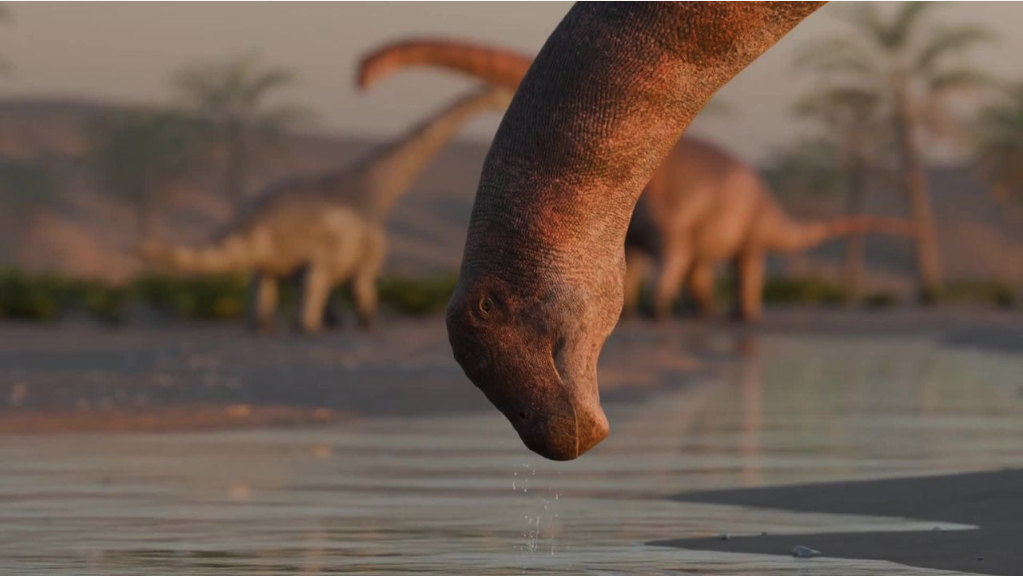New “Gentle Giant” Dinosaur Uncovered in Patagonia Alongside Rare Collection of Ancient Life

By Jill Dando News
National Geographic Explorer Diego Pol and a team of researchers and paleontologists from Argentina and Uruguay working in the Anacleto Formation near northern Patagonia, have identified a new long-necked dinosaur species, Chadititan calvoi, described in Revista del Museo Argentino Ciencias Naturales.
The new species, whose name means “titan of the salt” owing to its discovery near an extensive salt flat, is a herbivorous titanosaur belonging to the Rinconsaurian group, known for their uniquely slender bodies compared to other titanosaurs.
Chadititan was a small, slender dinosaur estimated to measure about 7 meters in length. Its well-preserved bones show that it had elongated vertebrate and delicate limb bones that set it apart from its relatives.
WATCH VIDEO:

In addition, Pol and the team of researchers also uncovered the first fossil record of Neocyclotidae (a family of tropical land snails) and the first undisputed record for the subulinid genus of Leptinaria, a kind of small, tropical air-breathing land snail.
These findings were among a trove of fossils that shed light on the ecosystem of the time and the diversity of ancient life that coexisted with Chadititan in the Anacleto Formation roughly 78 million years ago.
The collection includes garfishes, lungfishes, turtles, crocodile relatives, dinosaurs, snails and clams deposited in what was a small pond surrounded by sand dunes and palm trees in what was an otherwise arid environment.
“In addition to Chadititan, the fossils we identified of mollusks, fish, and turtles, enriches our understanding of this ancient ecosystem and expands our knowledge of life in Patagonia near the end of the dinosaur era,” said Explorer Diego Pol.
“Just by looking at the presence or absence of species in an area can suggest what makes the environment unique. In this case, the abundance of turtles and scarcity of crocodiles compared to regions in Europe and North America during the same period further highlights how Patagonian ecosystems were distinct as the continents drifted apart during the Cretaceous.”
"One of the most remarkable aspects of the discovered fauna is the overwhelming abundance of freshwater turtles, which make up more than 90% of the recovered fossils. This high percentage is highly unusual, as in coeval sites from North America and Europe, turtles rarely account for more than 50% of the fauna,” said Federico Agnolin, the first author on the paper.
Pol’s work is supported by the National Geographic Society and aims to broaden our scientific understanding of dinosaurs and vertebrates that existed throughout Patagonia during the last 15 million years of the Cretaceous Period.
His work will also build a database to help researchers identify extinction patterns at the end of the Cretaceous in South America relative to other regions of the world.
“Through the discovery of Chadititan calvoi and this rare collection of ancient life that lived alongside it, Pol’s work provides a valuable source of information to guide our understanding of the evolution of life during the Campanian-Masstrichtian time lapse in Patagonia,” said Ian Miller, the National Geographic Society’s Chief Science and Innovation Officer. “Diego and his team of global experts, researchers and lab technicians are bringing to life new insights about this lost world and furthering the National Geographic Society’s work of scientific exploration to better understand the wonder of our world and share those findings with the global community.”
For more stories click here
Subscribe today in just 30 seconds to support our mission.
📢 Subscribe & be part of the movement:
👉 https://www.goodnewspost.co.uk/#/portal/
OUR VISION: A PEOPLE-FIRST WORLD NEWS
The world is drowning in bad news. Anxiety, fear, and negativity dominate headlines. Social media fuels 24/7 doomscrolling, and a mental health crisis is spiraling out of control.
ENOUGH IS ENOUGH. IT’S TIME TO FIGHT BACK.
That's why we created The Good News Post—a positive news ecosystem designed to put people first and inspire a world that is:
Deliberately social media-free. Join us where real connection happens





